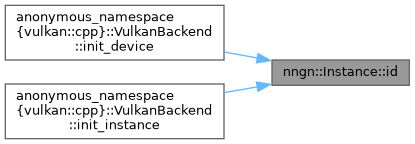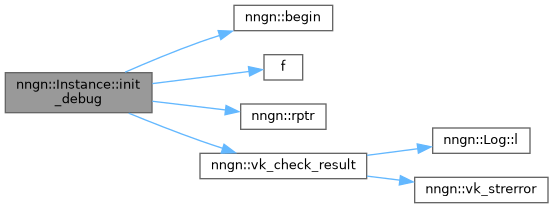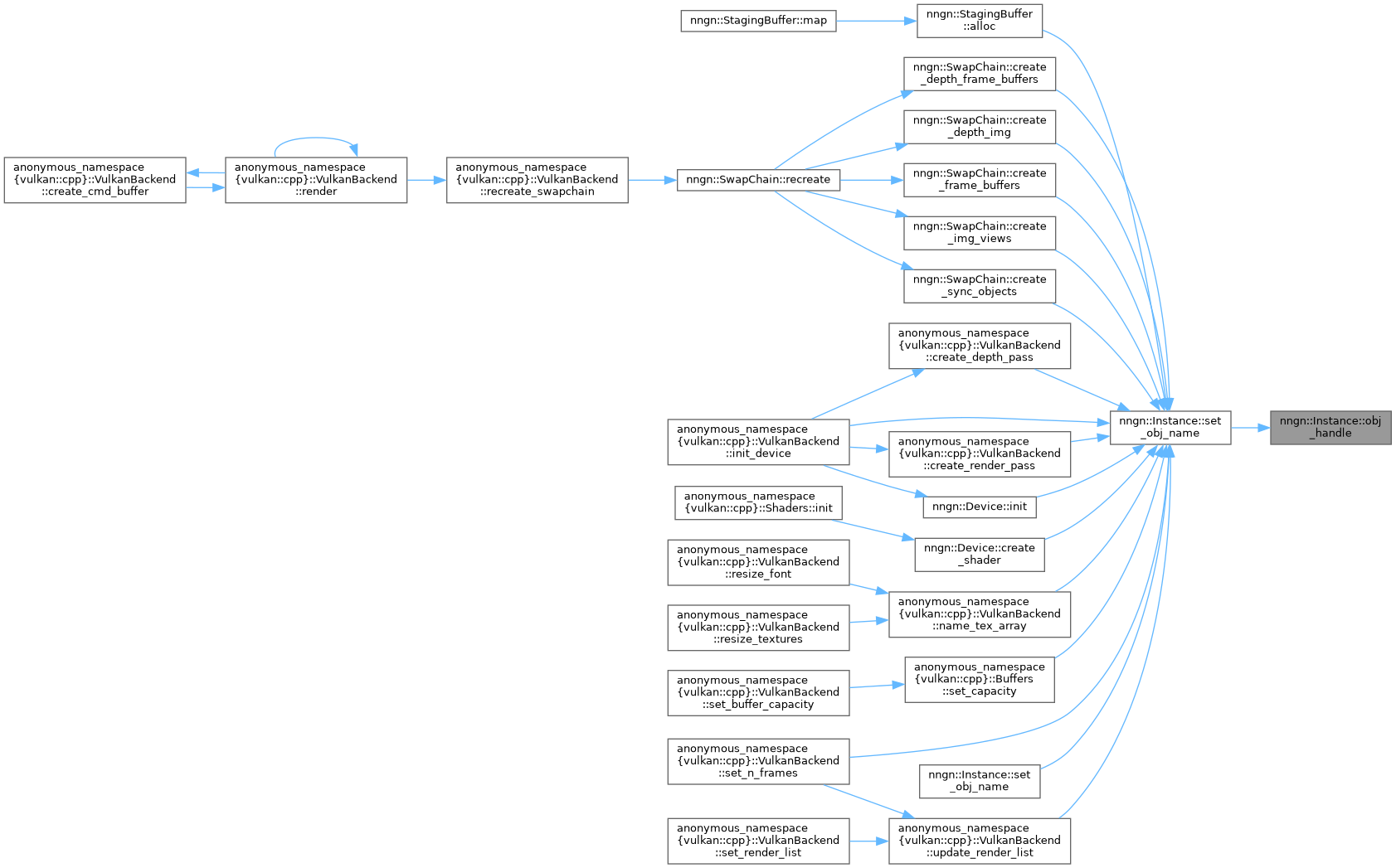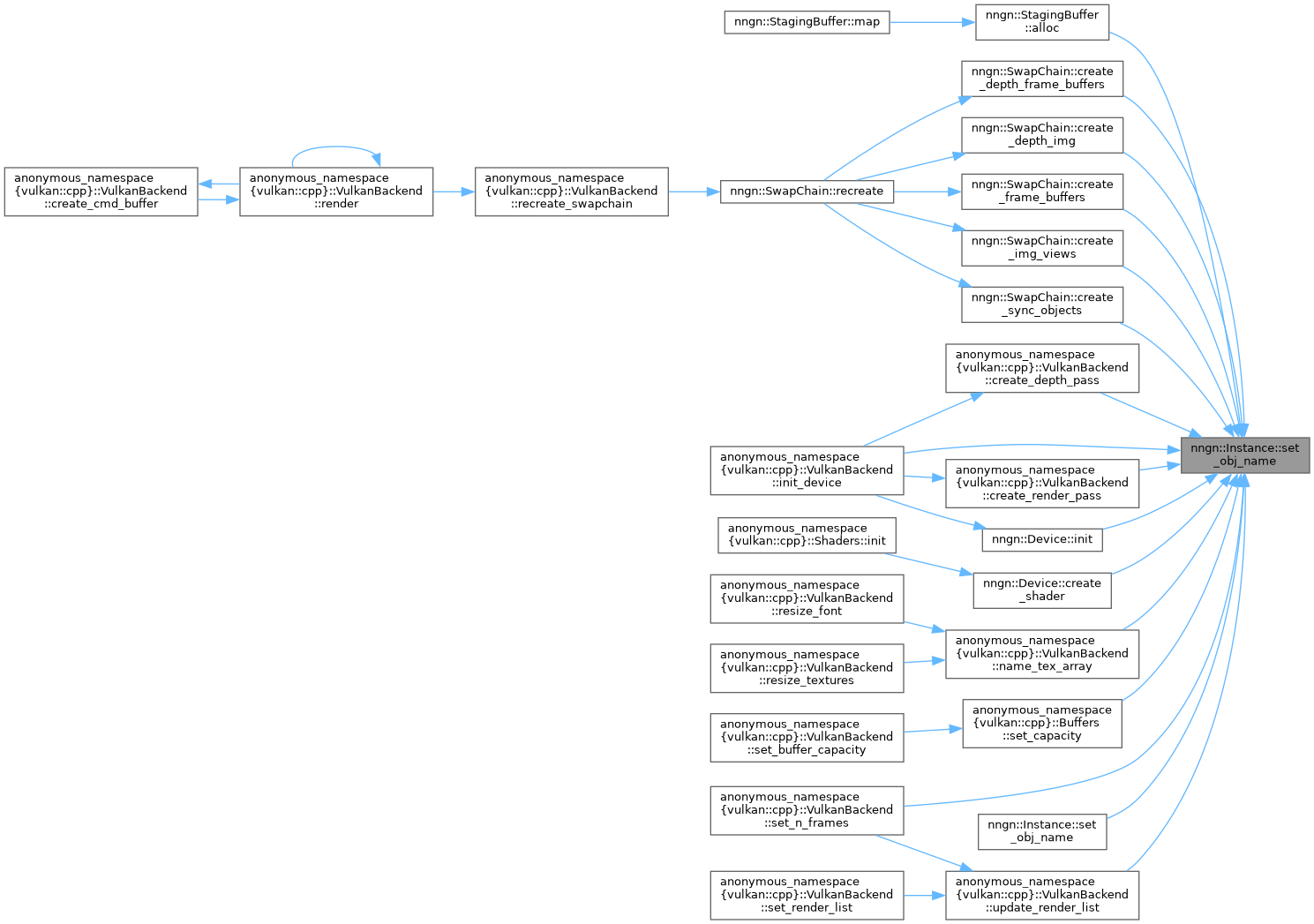Loading...
Searching...
No Matches
Public Types |
Public Member Functions |
Private Member Functions |
Static Private Member Functions |
Private Attributes |
List of all members
nngn::Instance Class Reference
Owning wrapper for a Vulkan instance. More...
#include <instance.h>
Public Types | |
| using | ErrorFn = void(void*) |
Public Member Functions | |
| Instance (void)=default | |
| ~Instance (void) | |
| Destroys the VkInstance and debug objects. | |
| bool | init (Graphics::Version version, std::span< const char *const > extensions) |
| Initializes an instance with no debug capabilities. | |
| bool | init_debug (Graphics::Version version, std::span< const char *const > extensions, std::span< const char *const > layers, ErrorFn error_fn, void *error_data, Graphics::LogLevel log_level) |
| Initializes an instance in debug mode. | |
| VkInstance | id () const |
| Provides access to the underlying Vulkan handle. | |
| void | set_error () |
| Called by the debug callback when an error is received. | |
| template<typename R > | |
| R | get_proc_addr (const char *name) const |
Retrieves a function pointer by name, cast to R. | |
| template<typename T > | |
| bool | set_obj_name (VkDevice dev, T obj, std::string_view name) const |
| Sets the debug name of an object. | |
| template<typename T > | |
| bool | set_obj_name (VkDevice d, T obj, std::string_view name, std::size_t n, std::string *buf) const |
| Sets the debug name of an object. | |
| template<typename T > | |
| bool | set_obj_name (VkDevice d, std::span< T > v, std::string_view name) const |
| Sets the debug name of a range of objects. | |
| template<typename T > | |
| bool | set_obj_name (VkDevice d, T obj, std::string_view name, std::size_t n) const |
| Sets the debug name of a range of objects. | |
Private Member Functions | |
| bool | set_obj_name (VkDevice d, VkObjectType t, std::uint64_t obj, std::string_view name) const |
| bool | set_obj_name (VkDevice d, VkObjectType t, std::uint64_t obj, std::string_view name, std::size_t n, std::string *buf) const |
Static Private Member Functions | |
| template<typename T > | |
| static auto | obj_handle (T o) |
Private Attributes | |
| VkInstance | h = {} |
| VkDebugUtilsMessengerEXT | messenger = {} |
| PFN_vkSetDebugUtilsObjectNameEXT | set_obj_name_f = {} |
| ErrorFn * | error_fn = {} |
| void * | error_data = {} |
Detailed Description
Owning wrapper for a Vulkan instance.
Member Typedef Documentation
◆ ErrorFn
| using nngn::Instance::ErrorFn = void(void*) |
Constructor & Destructor Documentation
◆ Instance()
|
default |
◆ ~Instance()
| nngn::Instance::~Instance | ( | void | ) |
Destroys the VkInstance and debug objects.
Here is the call graph for this function:

Member Function Documentation
◆ get_proc_addr()
template<typename R >
| R nngn::Instance::get_proc_addr | ( | const char * | name | ) | const |
Retrieves a function pointer by name, cast to R.
Here is the call graph for this function:

◆ id()
|
inline |
Provides access to the underlying Vulkan handle.
Here is the caller graph for this function:

◆ init()
| bool nngn::Instance::init | ( | Graphics::Version | version, |
| std::span< const char *const > | extensions ) |
Initializes an instance with no debug capabilities.
Here is the call graph for this function:

Here is the caller graph for this function:

◆ init_debug()
| bool nngn::Instance::init_debug | ( | Graphics::Version | version, |
| std::span< const char *const > | extensions, | ||
| std::span< const char *const > | layers, | ||
| ErrorFn | error_fn, | ||
| void * | error_data, | ||
| Graphics::LogLevel | log_level ) |
Initializes an instance in debug mode.
extensions and layers must be supported by the implementation (see InstanceInfo).
- Parameters
-
error_fn Called when the debug callback reports an error. error_data Argument for error_fn.
Here is the call graph for this function:

Here is the caller graph for this function:

◆ obj_handle()
Here is the caller graph for this function:

◆ set_error()
|
inline |
Called by the debug callback when an error is received.
◆ set_obj_name() [1/6]
template<typename T >
|
inline |
Sets the debug name of a range of objects.
Here is the call graph for this function:

◆ set_obj_name() [2/6]
template<typename T >
|
inline |
Sets the debug name of a range of objects.
Here is the call graph for this function:

◆ set_obj_name() [3/6]
template<typename T >
|
inline |
Sets the debug name of an object.
Here is the call graph for this function:

◆ set_obj_name() [4/6]
|
private |
Here is the call graph for this function:

◆ set_obj_name() [5/6]
|
private |
Here is the call graph for this function:

◆ set_obj_name() [6/6]
template<typename T >
|
inline |
Sets the debug name of an object.
Here is the call graph for this function:

Here is the caller graph for this function:

Member Data Documentation
◆ error_data
|
private |
◆ error_fn
|
private |
◆ h
|
private |
◆ messenger
|
private |
◆ set_obj_name_f
|
private |
The documentation for this class was generated from the following files:
- src/graphics/vulkan/instance.h
- src/graphics/vulkan/instance.cpp